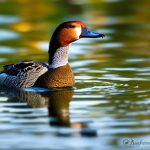Broody duck breeds are a specific type of duck breed that have a natural instinct to sit on and hatch their own eggs. Unlike non-broody duck breeds, which typically do not exhibit this behavior, broody duck breeds are known for their strong maternal instincts and desire to raise their own young. This makes them popular among duck breeders who are looking for a more natural and hands-off approach to hatching and raising ducklings.
The main difference between broody duck breeds and non-broody duck breeds is their inclination to sit on and incubate their eggs. Non-broody duck breeds will lay their eggs and move on, leaving the eggs unattended. Broody duck breeds, on the other hand, will diligently sit on their eggs, keeping them warm and turning them regularly to ensure proper development. This behavior is instinctual and has been passed down through generations of broody duck breeds.
Broody duck breeds are popular among duck breeders for several reasons. Firstly, they offer a more natural approach to hatching and raising ducklings. Instead of relying on artificial incubators and heat lamps, broody duck breeds can take care of the entire process themselves. This can be appealing to breeders who want a more hands-off approach or who may not have access to the necessary equipment. Additionally, broody duck breeds have higher hatch rates compared to non-broody duck breeds, which can be advantageous for breeders looking to increase their flock size.
Key Takeaways
- Broody duck breeds are known for their tendency to sit on and hatch eggs.
- Characteristics of broody duck breeds include being more docile and less interested in laying eggs.
- Raising broody duck breeds can provide benefits such as natural incubation and increased self-sufficiency.
- Popular broody duck breeds for egg hatching include Muscovy, Pekin, and Rouen ducks.
- Broody duck breeds that are good mothers include Muscovy and Khaki Campbell ducks.
- Differences between broody duck breeds and non-broody duck breeds include behavior and egg-laying tendencies.
- Tips for caring for broody duck breeds include providing a safe and comfortable nesting area and monitoring their health.
- Challenges of raising broody duck breeds can include aggression towards other ducks and the need for separate housing during brooding.
- Encouraging broodiness in ducks can be done by providing a quiet and secluded nesting area and limiting egg collection.
- Whether or not raising broody duck breeds is right for you depends on your goals and preferences as a duck owner.
Characteristics of Broody Duck Breeds
Broody duck breeds have distinct physical and behavioral characteristics that set them apart from non-broody duck breeds. Physically, broody duck breeds tend to be larger in size compared to non-broody ducks. They have a sturdy build with broad chests and strong legs, which allows them to sit on their eggs for extended periods without discomfort. Their feathers are also denser and more insulating, providing better protection for the eggs during incubation.
Behaviorally, broody duck breeds exhibit strong maternal instincts. They will actively seek out a suitable nesting area and will diligently sit on their eggs, rarely leaving the nest except to eat, drink, and relieve themselves. They are protective of their eggs and will defend them against potential threats. Broody duck breeds also have a tendency to be more docile and calm compared to non-broody ducks, which can make them easier to handle and work with.
In contrast, non-broody duck breeds do not exhibit the same level of maternal behavior. They will lay their eggs and move on, showing little interest in incubating or raising their young. Non-broody ducks are generally more active and independent, often exploring their surroundings and engaging in social interactions with other ducks. They may require more space and stimulation compared to broody duck breeds.
Benefits of Raising Broody Duck Breeds
There are several benefits to raising broody duck breeds, which is why they are favored by many duck breeders. One of the main advantages is higher hatch rates. Broody duck breeds have a natural instinct for incubating eggs, which means they are more likely to successfully hatch a higher percentage of their eggs compared to non-broody ducks. This can be beneficial for breeders who are looking to increase their flock size or produce a specific number of ducklings.
Another benefit of raising broody duck breeds is the natural incubation process. Instead of relying on artificial incubators, broody ducks can provide the ideal conditions for egg development through their body heat and regular turning of the eggs. This can result in healthier and stronger ducklings, as they have been nurtured in a more natural environment.
Raising broody duck breeds also reduces the need for incubators and artificial heat sources. This can be advantageous for breeders who may not have access to or want to invest in expensive equipment. By allowing the broody duck to take care of the incubation process, breeders can save on costs and resources.
Popular Broody Duck Breeds for Egg Hatching
There are several broody duck breeds that are popular among breeders for their ability to successfully hatch and raise their own eggs. These breeds include Muscovy ducks, Pekin ducks, Rouen ducks, and Khaki Campbell ducks.
Muscovy ducks are known for their excellent brooding abilities. They are large, heavy ducks with a calm and docile temperament. Muscovy ducks are also known for their high fertility rates and ability to raise large clutches of ducklings.
Pekin ducks are another popular broody duck breed. They are medium-sized ducks with a friendly and sociable nature. Pekin ducks have a strong maternal instinct and will diligently sit on their eggs until they hatch. They are also known for their high egg production, making them a popular choice for both meat and egg production.
Rouen ducks are a larger breed of broody duck known for their beautiful plumage. They have a calm and gentle temperament, making them easy to handle and work with. Rouen ducks are excellent mothers and will take great care of their eggs and ducklings.
Khaki Campbell ducks are a smaller breed of broody duck known for their high egg production. They have a slender build and are highly active and alert. Khaki Campbell ducks are excellent mothers and will diligently sit on their eggs until they hatch.
Broody Duck Breeds That Are Good Mothers
Several broody duck breeds are known for being excellent mothers, providing exceptional care to their eggs and ducklings. Muscovy ducks, Pekin ducks, Rouen ducks, and Khaki Campbell ducks all fall into this category.
Muscovy ducks are particularly renowned for their mothering abilities. They are attentive and protective mothers, ensuring the safety and well-being of their ducklings. Muscovy ducks will actively lead their ducklings to food and water sources, teaching them important survival skills.
Pekin ducks are also known for their nurturing nature. They will diligently care for their eggs and ducklings, providing warmth and protection. Pekin ducks are gentle and patient with their young, making them excellent mothers.
Rouen ducks are attentive mothers who will keep a close eye on their eggs and ducklings. They will guide their young to food and water sources, teaching them how to forage and swim. Rouen ducks are known for their calm and gentle demeanor, which translates into their mothering behavior.
Khaki Campbell ducks are dedicated mothers who will provide constant care to their eggs and ducklings. They are highly protective of their young and will defend them against potential threats. Khaki Campbell ducks are also known for their high egg production, making them valuable for both meat and egg production.
Differences Between Broody Duck Breeds and Non-Broody Duck Breeds

There are several key differences between broody duck breeds and non-broody duck breeds in terms of their egg-laying habits, incubation habits, mothering habits, and temperament.
In terms of egg-laying habits, broody duck breeds will lay a clutch of eggs before exhibiting brooding behavior. Once they have laid a sufficient number of eggs, they will begin the incubation process. Non-broody duck breeds, on the other hand, will continue to lay eggs without showing any interest in incubating or raising them.
During the incubation period, broody duck breeds will diligently sit on their eggs, keeping them warm and turning them regularly to ensure proper development. Non-broody duck breeds do not exhibit this behavior and will leave their eggs unattended.
When it comes to mothering habits, broody duck breeds are highly attentive and protective of their eggs and ducklings. They will actively care for and guide their young, teaching them important survival skills. Non-broody duck breeds do not exhibit the same level of maternal behavior and will not provide the same level of care to their young.
In terms of temperament, broody duck breeds tend to be more docile and calm compared to non-broody duck breeds. This can make them easier to handle and work with, especially when it comes to caring for their eggs and ducklings.
Tips for Caring for Broody Duck Breeds
Caring for broody duck breeds requires some specific considerations to ensure the health and well-being of both the mother and her eggs. Here are some tips for caring for broody duck breeds:
1. Provide a suitable nesting area: Broody ducks need a quiet and secluded area to build their nest and incubate their eggs. Provide a nesting box or sheltered area with soft bedding material, such as straw or hay, where the duck can create a comfortable nest.
2. Provide adequate food and water: Broody ducks will need access to fresh food and water during the incubation period. Make sure to provide a balanced diet that meets their nutritional needs, including a source of calcium for eggshell development.
3. Monitor the mother and eggs: Keep a close eye on the broody duck and her eggs, checking for any signs of distress or illness. Ensure that the nesting area is clean and free from potential hazards.
4. Prepare for the hatch: As the hatch date approaches, make sure to have a suitable brooding area ready for the ducklings. This should include a heat source, such as a heat lamp or brooder, as well as food and water containers.
Challenges of Raising Broody Duck Breeds
While there are many benefits to raising broody duck breeds, there are also some challenges that breeders may face. These challenges include an increased risk of predators, an increased risk of disease, a need for more space, and a need for more time and attention.
Broody duck breeds that are sitting on their eggs are more vulnerable to predators, as they are less mobile and focused on incubation. It is important to provide a secure and predator-proof nesting area to minimize the risk of predation.
Broody duck breeds may also be more susceptible to certain diseases, as their immune system may be compromised during the incubation period. It is important to monitor the health of the broody duck and provide appropriate veterinary care if needed.
Broody duck breeds require more space compared to non-broody ducks, as they will need a suitable nesting area and room to move around during the incubation period. It is important to provide enough space to ensure the comfort and well-being of the broody duck.
Raising broody duck breeds also requires more time and attention compared to non-broody ducks. The broody duck will need regular monitoring and care throughout the incubation period, including turning the eggs and providing food and water. It is important to be prepared for the additional time commitment that comes with raising broody duck breeds.
How to Encourage Broodiness in Ducks
If you are interested in raising broody duck breeds, there are several ways to encourage broodiness in ducks:
1. Provide a suitable nesting area: Ducks need a quiet and secluded area to build their nest and feel safe enough to exhibit brooding behavior. Provide a nesting box or sheltered area with soft bedding material where the ducks can create a comfortable nest.
2. Limit artificial light: Ducks require a certain amount of darkness to trigger their natural instinct for brooding. Limiting artificial light in their environment can help encourage broodiness.
3. Limit human interaction: Ducks may be less likely to exhibit brooding behavior if they are constantly disturbed or handled by humans. Minimize human interaction with the ducks during the nesting period to encourage broodiness.
4. Provide a suitable diet: A well-balanced diet that meets the nutritional needs of the ducks is important for encouraging broodiness. Make sure to provide a diet that includes all the necessary nutrients, including calcium for eggshell development.
Is Raising Broody Duck Breeds Right for You?
Raising broody duck breeds can be a rewarding and fulfilling experience for duck breeders. The natural incubation process, higher hatch rates, and the ability to raise ducklings without relying on artificial equipment are some of the benefits of raising broody duck breeds. However, it is important to consider the challenges that come with raising broody duck breeds, such as increased risk of predators, increased risk of disease, and the need for more space and time commitment.
Before deciding to raise broody duck breeds, it is important to do further research and consider your own circumstances and preferences. Assess whether you have the necessary resources, such as suitable nesting areas and adequate time and attention, to care for broody duck breeds. Additionally, consider your goals as a breeder and whether raising broody duck breeds aligns with those goals.
Overall, raising broody duck breeds can be a rewarding and enjoyable experience for those who are willing to put in the time and effort. By understanding the characteristics, benefits, challenges, and care requirements of broody duck breeds, you can make an informed decision about whether raising broody duck breeds is right for you.
If you’re interested in broody duck breeds, you might also want to check out this informative article on “How Many Eggs Do Geese Lay?” It provides valuable insights into the breeding habits of geese and their egg-laying capabilities. Understanding the number of eggs geese lay can help you make informed decisions when it comes to raising and breeding these fascinating birds. To learn more, click here.
FAQs
What are broody duck breeds?
Broody duck breeds are those that have a natural tendency to sit on their eggs and incubate them until they hatch.
Which duck breeds are considered broody?
Some of the most common broody duck breeds include Muscovy, Pekin, Rouen, and Cayuga ducks.
What are the benefits of broody duck breeds?
Broody duck breeds can be beneficial for small-scale farmers or homesteaders who want to hatch their own ducklings without the need for an incubator. Additionally, broody ducks can be good mothers and provide better care for their young.
How can you tell if a duck is broody?
Broody ducks will often become very protective of their eggs and may hiss or peck at anyone who comes near them. They may also spend long periods of time sitting on their eggs and may pluck feathers from their breast to create a nest.
What should you do if you have a broody duck?
If you have a broody duck, it is important to provide her with a safe and comfortable nesting area. You should also make sure she has access to food and water and is protected from predators. Once the eggs hatch, you should continue to provide care for the mother and her ducklings.
Meet Walter, the feathered-friend fanatic of Florida! Nestled in the sunshine state, Walter struts through life with his feathered companions, clucking his way to happiness. With a coop that’s fancier than a five-star hotel, he’s the Don Juan of the chicken world. When he’s not teaching his hens to do the cha-cha, you’ll find him in a heated debate with his prized rooster, Sir Clucks-a-Lot. Walter’s poultry passion is no yolk; he’s the sunny-side-up guy you never knew you needed in your flock of friends!







